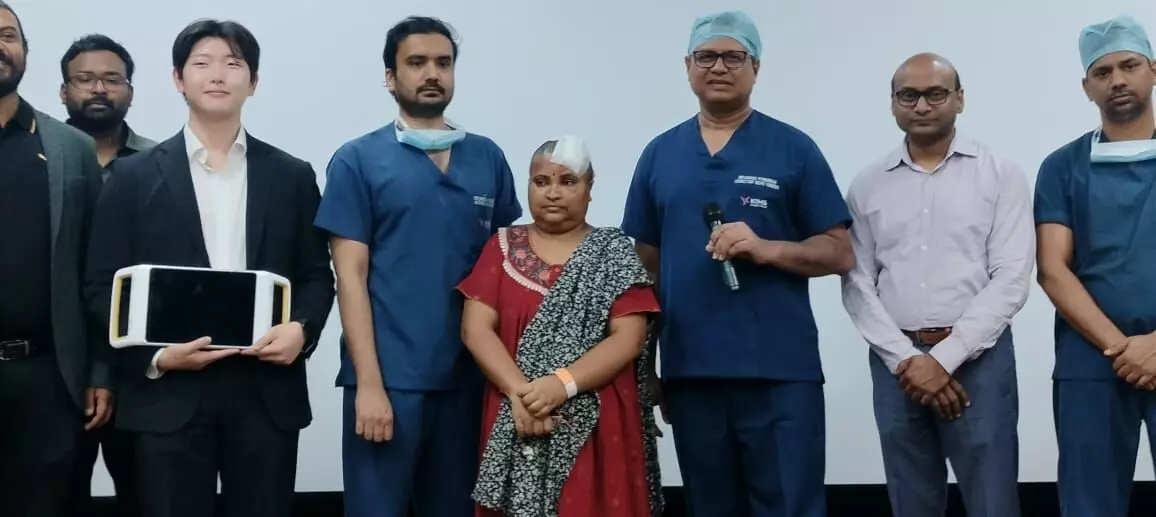KIMS doctors in Hyderabad use Skia's augmented reality, AI technology in 16 brain surgeries
Dr. Manas Panigrahi, at KIMS Hospital, Secunderabad, has embraced Skia’s transformative capabilities, having successfully performed 16 surgeries using this cutting-edge device.

HYDERABAD: Tumor surgeries are intricate procedures that demand precision and accuracy to ensure successful outcomes. Despite advancements in medical technology, the potential for human error remains a concern. However, a groundbreaking solution has emerged to revolutionize brain surgeries, offering newfound hope for patients and surgeons alike.
Medical extended reality software developer Skia has come up with an innovative fusion of Augmented Reality (AR) and Artificial Intelligence (AI), designed to enhance surgical precision and streamline treatment processes. Developed by a team of visionary minds, the product heralds a new era in neurosurgery, empowering surgeons to navigate the complexities of the brain with unprecedented accuracy.
Dr. Manas Panigrahi, head of the department and senior consultant of neurosurgery, at KIMS Hospital, Secunderabad, has embraced Skia’s transformative capabilities, having successfully performed 16 surgeries using this cutting-edge device. Dr. Panigrahi elaborates on Skia’s efficacy: "A new device from Skia is proving to be very useful in brain surgeries. Unlike conventional methods that rely heavily on neuro-navigation systems, Skia harnesses the power of AR and AI to offer a more flexible and intuitive approach."
Traditionally, brain tumor surgeries entail a meticulous process involving MRI and CT scans for preoperative planning, followed by intraoperative navigation to guide surgical interventions. However, the reliance on neuro-navigation systems often poses challenges, including increased anesthesia doses and elevated procedural costs. Skia addresses these issues by providing a non-invasive, markerless solution that seamlessly integrates with existing imaging modalities.
The functionality of SKIA is truly remarkable. Upon receiving a CT scan, the device generates a 3D digital replica of the patient's brain, known as a digital twin. Leveraging AI algorithms, Skia then overlays this digital twin onto the patient's anatomy in real-time, offering surgeons unparalleled insights into tumor localisation, size, and surrounding structures. This advanced visualisation enables precise surgical planning and execution, ultimately enhancing patient safety and surgical outcomes.
Skia’s innovative approach extends beyond neurosurgery, offering applications in various medical specialties. By scanning the patient's body and employing harmless lasers to capture detailed anatomical data, Skia facilitates comprehensive preoperative assessments for conditions such as cancer. This holistic approach not only enhances diagnostic accuracy but also minimizes radiation exposure for patients.
KIMS Hospitals' recent acquisition of the Skia Augmented Reality device marks a significant milestone in the advancement of surgical technology. With its successful integration into 16 brain surgeries, KIMS Hospital exemplifies its commitment to pioneering innovation and delivering exceptional patient care. Dr. Panigrahi affirms that these neurosurgeries represent a paradigm shift in surgical practice, setting a new standard for precision and efficiency.
As the world's first markerless Augmented Reality device, the Skia device holds immense promise for the future of medicine. Its transformative impact has already touched the lives of countless patients worldwide, offering renewed hope and optimism in the face of complex medical challenges.
How Skia works:
- Tim Kim, Chief Marketing Officer, of Skia, Korea said that by utilising millions of harmless lasers, the devise scans the patient's body to create an exact 3D digital copy, known as a digital twin.
- This digital twin is then analysed by its artificial intelligence (AI) to recognise vital structures like bones, blood vessels, and tumors from the patient's CT data.
- Subsequently, its AI aligns the CT model precisely with the patient's body, allowing for the projection of detailed 3D medical images directly onto the patient.
- This innovative approach eliminates the need for traditional QR code tracking and enables surgeons to visualise internal structures with unparalleled accuracy.
- With Skia’s navigation accuracy of 1.5mm, well within the US FDA's recommended standards, this technology sets a new benchmark in surgical precision and patient care.



